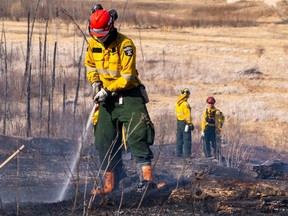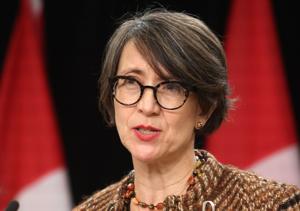World
Canada Allocates $45.7M to Combat Growing Wildfire Threats

With wildfire season underway, the federal government of Canada has announced an allocation of $45.7 million for 30 projects aimed at enhancing wildfire prevention, mitigation, and recovery efforts. The funding, revealed by Calgary Confederation MP Corey Hogan on behalf of Energy and Natural Resources Minister Tim Hodgson, is part of the Build and Mobilize Foundational Wildland Fire Knowledge program, administered by Natural Resources Canada.
The initiative seeks to advance research that will bolster Canada’s defenses against the increasing threat of wildfires. It will focus on improving risk assessments and developing adaptive forestry practices. Hogan emphasized the growing challenges posed by wildfires, stating that they are becoming “more frequent, more intense and more dangerous,” impacting many Canadians directly.
Canada’s wildfire season in 2023 was recorded as the most destructive ever, with over 14 million hectares burned—approximately four times the 10-year average. As of now, in 2024, more than 5.3 million hectares have already been scorched. In Alberta, there are currently 52 active wildfires, with 13 percent classified as out of control. The province’s online dashboard reports that approximately 677,000 hectares have burned this year alone.
Addressing the Impact of Wildfires
During a press conference, Hogan highlighted the extensive consequences of wildfires, which extend beyond environmental damage to include economic and psychological impacts. “It’s incumbent on governments across all levels to do what they can to both avoid these things happening in the first place and respond to them as rapidly as possible,” he stated.
According to estimates from Natural Resources Canada, fire suppression costs could potentially double by 2040 as wildfire risks continue to escalate. Hogan also pointed to a troubling trend in smoke exposure, particularly in Calgary. From 1953 to 2014, the city averaged about 12 smoke hours per year. In contrast, Calgary recorded 200 smoke hours in 2024, down from 512 hours in 2023, marking the fifth-highest total in 70 years.
Funding for Local Projects
Among the projects receiving federal funding are two initiatives based in Alberta. The Swan River First Nation will receive over $890,000 to develop a wildfire risk assessment and scenario exploration tool, designed to predict future wildfire risks for various landscapes. Meanwhile, the Blood Tribe Fire Guardianship program is being allocated $500,000 to enhance community knowledge sharing and develop resources, including cultural burn plans.
In a statement, Minister Hodgson reiterated the federal government’s commitment to safeguarding the health and economic stability of communities as wildfire threats persist. “Today’s announcement will allow us to prepare for future challenges by advancing wildfire knowledge, accelerating risk and mitigation strategies, and supporting Indigenous fire stewardship to build resilience and protect Canadian families and homes,” he noted.
Eleanor Olszewski, the Minister of Emergency Management and Community Resilience, emphasized that this funding is part of a broader strategy to strengthen Canada’s disaster preparedness. “This funding will help communities be ready for wildfire risks and protect their homes and land,” she said.
As wildfires rage across the country, provinces such as Newfoundland and Labrador are currently battling at least five active fires, including the 6,370 hectare Kingston fire in Conception Bay. Evacuation alerts have been issued, and assistance from other provinces is being mobilized, including water bombers from Quebec and Ontario, as well as support from the Canadian Armed Forces, which has deployed 80 wildland firefighters to assist in the efforts.
In British Columbia, 98 wildfires are currently burning, with nine classified as out of control. The ongoing wildfire threats underscore the urgent need for comprehensive and coordinated actions at all levels of government to mitigate the risks and protect communities across Canada.
-

 Politics4 weeks ago
Politics4 weeks agoSecwepemc First Nation Seeks Aboriginal Title Over Kamloops Area
-

 World5 months ago
World5 months agoScientists Unearth Ancient Antarctic Ice to Unlock Climate Secrets
-

 Entertainment5 months ago
Entertainment5 months agoTrump and McCormick to Announce $70 Billion Energy Investments
-

 Science5 months ago
Science5 months agoFour Astronauts Return to Earth After International Space Station Mission
-

 Lifestyle5 months ago
Lifestyle5 months agoTransLink Launches Food Truck Program to Boost Revenue in Vancouver
-

 Technology3 months ago
Technology3 months agoApple Notes Enhances Functionality with Markdown Support in macOS 26
-

 Lifestyle3 months ago
Lifestyle3 months agoManitoba’s Burger Champion Shines Again Amid Dining Innovations
-

 Top Stories2 months ago
Top Stories2 months agoUrgent Update: Fatal Crash on Highway 99 Claims Life of Pitt Meadows Man
-

 Politics4 months ago
Politics4 months agoUkrainian Tennis Star Elina Svitolina Faces Death Threats Online
-

 Sports5 months ago
Sports5 months agoSearch Underway for Missing Hunter Amid Hokkaido Bear Emergency
-

 Politics5 months ago
Politics5 months agoCarney Engages First Nations Leaders at Development Law Summit
-

 Technology5 months ago
Technology5 months agoFrosthaven Launches Early Access on July 31, 2025




















